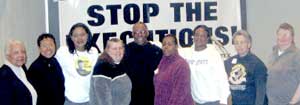Elaine Brown speaks on Lucasville Five case
By
Sharon Danann
Cleveland
Published Apr 19, 2007 9:19 PM
On April 7, Elaine Brown, former Black Panther Party leader and long-time
prisoner advocate, brought her message to Cleveland to raise awareness about
the political prisoners in Ohio known as the Lucasville Five and to help build
the campaign for their release.
|
From left to right, Betty Springer, Elaine Brown,
Saadiqah Hasan, Sharon Danann, Dwight Lamar,
Kandy Cannon, Jackie Thomas, Susan Schnur
and Martha Grevatt at Cleveland event.
Photo: Ericka Abram
|
The Five face death sentences based on trials that were mockeries of justice,
following the prison uprising in Lucasville, Ohio, in 1993. The event was
hosted by the Black Studies Program of Cleveland State University and the
Cleveland Lucasville Five Defense Committee.
Nearly one hundred dedicated people braved a snowstorm to hear Brown trace the
history of racism in this country, including the “black codes”
after the Civil War, which “made it a crime to be Black and not have a
job.” The punishment was work on a chain gang. This became the transition
from a “slave class to a criminal class” that is manifested in the
current prison population, which is 50 percent Black.
“Crime is a political question,” stated Brown. She gave as an
example the 5,000 Panamanians slaughtered when Colin Powell led the military
action to capture Manuel Noriega. “[Powell]’s not in the
slammer,” she pointed out.
Brown has been a powerful advocate for Michael Lewis, “Little B,”
who was only 13 when he was arrested. The media called him a “thug”
and a “super-predator.” In contrast, the media provided extenuating
circumstances, such as unhappiness in his home life, for Kip Kinkel of Oregon,
who killed his parents and two of his classmates and wounded 26 others.
Kinkel is white. Lewis is Black and clearly was “criminalized” by
the media.
Brown sees a “wonderful shift” in the resurgence of activism,
particularly that of prisoners and their supporters. She sees it as part of the
rejection of George Bush. Many people attending the event signed up to become
active in the campaign to the free the Lucasville Five.
Brown also spoke to a crowd of 300 at the University of Toledo on April 5. In
both speeches she highlighted the case of Siddique Abdullah Hasan, who is the
closest to exhausting his appeals and receiving an execution date.
Brown was persuaded to do the speaking tour by Jamil Abdullah Al-Amin (the
former H. Rap Brown), who has been in correspondence with Hasan. The tour was
organized by the Toledo chapter of the Campaign to End the Death Penalty.
“Lucasville” by Staughton Lynd available at
Leftbooks.com
Articles copyright 1995-2012 Workers World.
Verbatim copying and distribution of this entire article is permitted in any medium without royalty provided this notice is preserved.
Workers World, 55 W. 17 St., NY, NY 10011
Email:
[email protected]
Subscribe
[email protected]
Support independent news
DONATE


